- Home
- Piers Anthony
Centaur Aisle x-4
Centaur Aisle x-4 Read online
Centaur Aisle
( Xanth - 4 )
Piers Anthony
Dor agreed to act as King of Xanth so long as Trent was gone for a week. But the weeks passed and Trent did not return. Dor knew he had to rescue his king but with no magic powers, how could it be done...?
CENTAUR AISLE
4th Book in the Xanth series
Piers Anthony
Copyright 1981 by Piers Anthony
The author thanks Jerome Brown for the notion of the “Spelling Bee” used in the first chapter, and the many other fans whose letters of encouragement have caused the Xanth trilogy to be expanded. May those who feel Xanth is sexist have pleasure in this novel, wherein Mundania is shown to be worse.
Dor was trying to write an essay, because the King had decreed that any future monarchs of Xanth should be literate. It was an awful chore. He knew how to read, but his imagination tended to go blank when challenged to produce an essay, and he had never mastered conventional spelling.
“The Land of Xanth,” he muttered with deep disgust.
“What?” the table asked.
“The title of my awful old essay,” Dor explained dispiritedly. “My tutor Cherie, on whom be a muted anonymous curse, assigned me a one-hundred-word essay telling all about Xanth. I don’t think it’s possible. There isn’t that much to tell. After twenty-five words I’ll probably have to start repeating. How can I ever stretch it to a whole hundred? I’m not even sure there are that many words in the language.
“Who wants to know about Xanth?” the table asked. “I’m bored already.”
“I know you’re a board. I guess Cherie, may a hundred curseburrs tangle in her tail, wants to know.”
“She must be pretty dumb.”
Dor considered. “No, she’s infernally smart. All centaurs are. That’s why they’re the historians and poets and tutors of Xanth. May all their high-IQ feet founder.”
“How come they don’t rule Xanth, then?”
“Well, most of them don’t do magic, and only a Magician can rule Xanth. Brains have nothing to do with it-and neither do essays.”
Dor scowled at his blank paper.
“Only a Magician can rule any land,” the table said smugly. “But what about you? You’re a Magician, aren’t you? Why aren’t you King?”
“Well, I will be King, some day,” Dor said defensively, aware that he was talking with the table only to postpone a little longer the inevitable struggle with the essay. “When King Trent, uh, steps down. That’s why I have to be educated, he says.” He wished all kinds of maledictions on Cherie Centaur, but never on King Trent.
He resumed his morose stare at the paper, where he had now printed THU LANNED UV ZANTH. Somehow it didn’t look right, though he was sure he had put the TU’s in the right places.
Something tittered. Dor glanced up and discovered that the hanging picture of Queen Iris was smirking. That was one problem about working in Castle Roogna; he was always under the baleful eye of the Queen, whose principal business was snooping. With special effort, Dor refrained from sticking out his tongue at the picture.
Seeing herself observed, the Queen spoke, the mouth of the image moving. Her talent was illusion, and she could make the illusion of sound when she wanted to. “You may be a Magician, but you aren’t a scholar. Obviously spelling is not your forte.”
“Never claimed it was,” Dor retorted. He did not know what the word “forte” meant-perhaps it was a kind of small castle-but whatever it meant, spelling was not there. He did not much like the Queen, and the feeling was mutual, but both of them were constrained by order of the King to be reasonably polite to one another.
“Surely a woman of your extraordinary talents has more interesting things to do than peek at my stupid essay,” he said. Then, grudgingly, he added: “Your Majesty.”
“Indeed I do,” the picture agreed, its background clouding. She had of course noted the pause before he gave her title; it was not technically an insult, but the message was clear enough. The cloud in the picture had become a veritable thunderstorm, with jags of lightning shooting out like sparks. She would get back at him somehow.
“But you would never get your homework done if not supervised.”
Dor grimaced into the surface of the table. She was right on target there!
Then he saw that ink had smeared all across his essay-paper, ruining it. With an angry grunt he picked it up-and the ink slid off, pooled on the surface of the table, bunched together, sprouted legs, and scurried away. It leaped off the table like a gross bug and puffed into momentary vapor. It had been an illusion. The Queen had gotten back at him already. She could be extraordinarily clever in ugly little ways. Dor could not admit being angry about being fooled-and that made him angrier than ever.
“I don’t see why anyone has to be male to rule Xanth,” the picture said. That was of course a chronic sore point with the Queen. She was a Sorceress fully as talented as any Magician, but by Xanth law/custom no woman could be King.
“I live in the Land of Xanth,” Dor said slowly, voicing his essay as he wrote, ignoring the Queen with what he hoped was insulting politeness. “Which is distinct from Mundania in that there is magic in Xanth and none in Mundania.” It was amazing how creative he became when there was a negative aspect to it. He had twenty-three words already!
Dor cracked an eyelid, sneaking a peek at the picture. It had reverted to neutral. Good; the Queen had tuned out. If she couldn’t bug him with crawling illusions, she wasn’t interested.
But now his inspiration dehydrated. He had an impossible one hundred whole words to do, six times his present total. Maybe five times; he was not particularly apt at higher mathematics either. Four more words, if he counted the title. A significant fraction of the way through, but only a fraction. What a dreary chore!
Irene wandered in. She was King Trent and Queen Iris’s daughter, the palace brat, often a nuisance-but sometimes not. It griped Dor to admit it, but Irene was an extremely pretty girl, getting more so, and that exerted an increasing leverage upon him. It made fighting with her awkward.
“Hi, Dor,” she said, bouncing experimentally. “What are you doing?”
Dor, distracted momentarily by the bounce, lost track of the sharp response he had planned. “Oh, come on,” he grumped. “You know your mother got tired of snooping on me, so she assigned you to do it instead.”
Irene did not deny it. “Well, somebody has to snoop on you, dummy. I’d rather be out playing with Zilch.”
Zilch was a young sea cow that had been conjured for her fifteenth birthday. Irene had set her up in the moat and used her magic to promote the growth of sturdy wallflowers to wall off a section of water, protecting Zilch from the moat-monsters while she grazed. Dor regarded Zilch as a great blubbery slob of an animal, but anything that distracted Irene was to some extent worthwhile. She took after her mother in certain annoying ways.
“Go ahead and play with the cow,” Dor suggested disparagingly. “I won’t tell.”
“No, a Princess has to do her duty.” Irene never spoke of duty unless it was something she wanted to do anyway. She picked up his essay-paper.
“Hey, give that back!” Dor protested, reaching for it.
“You heard him, snit!” the paper agreed. “Give me back!”
That only made Irene ornery. She backed away, hanging on to the paper, her eyes scanning the writing. Her bosom heaved with barely suppressed laughter. “Oh, say, this is something! I didn’t think anybody could misspell ‘Mundania’ that badly!”
Dor leaped for her, his face hot, but she danced back again, putting the paper behind her. This was her notion of entertainment-teasing him, making him react one way or another. He tried to reach around her-and found himself emb
racing her, unintentionally.
Irene had always been a cute girl and socially precocious. In recent years nature had rushed to endow her generously, and this was quite evident at close range. Now she was a green-eyed, green-tint-haired-occurring naturally; she did not color her hair-buxom beauty. What was worse, she knew it, and constantly sought new ways to use it to her advantage. Today she was dressed in a green blouse and skirt that accentuated her figure and wore green slippers that enhanced her fine legs and feet. In short, she had prepared well for this encounter and had no intention of letting him write his essay in peace.
She took a deep breath, inflating herself against him. “I’ll scream,” she breathed in his ear, taunting him.
But Dor knew how to handle her. “I’ll tickle,” he breathed back.
“That’s not fair!” For she could not scream realistically while giggling, and she was hyper-ticklish, perhaps because she thought it was fashionable for young ladies to be so. She had heard somewhere that ticklishness made girls more appealing.
Irene’s hand moved swiftly, trying to tuck the paper into her bosom, where she knew he wouldn’t dare go for it. But Dor had encountered this ploy before, too, and he caught her wrist en route. He finally got his fingers on the essay-paper, for he was stronger than she, and she also deemed it unladylike to fight too hard. Image was almost as important to her as mischief. She let the paper go, but tried yet another ploy. She put her arms around him. “I’ll kiss.”
But he was ready even for that. Her kisses could change to bites without notice, depending on her mercurial mood. She was not to be trusted, though in truth the close struggle had whetted his appetite for some such diversion. She was scoring on him better than she knew. “Your mother’s watching.”
Irene turned him loose instantly. She was a constant tease; but in her mother’s presence she always behaved angelically. Dor wasn’t sure why this was so, but suspected that the Queen’s desire to see Irene become Queen after her had something to do with it. Irene didn’t want to oblige her mother any more than she wanted to oblige anyone else, and expressing overt interest in Dor would constitute a compromising attitude. The Queen resented Dor because he was a full Magician while her daughter was not, but she was not about to let him make anyone else’s daughter Queen. Irene, ironically, did want to be Queen, but also wanted to spite her mother, so she always tried to make it seem that Dor was chasing her while she resisted.
The various facets of this cynical game became complex on occasion.
Dor himself wasn’t sure how he felt about it all. Four years ago, when he was twelve, he had gone on an extraordinary adventure into Xanth’s past and had occupied the body of a grown, muscular, and highly coordinated barbarian. He had learned something about the ways of men and women. Since he had had an opportunity to play with adult equipment before getting there himself, he had an inkling that the little games Irene played were more chancy than she knew.
So he stayed somewhat clear, rejecting her teasing advances, though this was not always easy. Sometimes he had strange, wicked dreams, wherein he called one of her bluffs, and it wasn’t exactly a bluff, and then the hand of an anonymous censor blotted out a scene of impending fascination.
“Dumbo!” Irene exclaimed irately, staring at the still picture on the wall. “My mother isn’t watching us!”
“Got you off my case, though, didn’t it?” Dor said smugly. “You want to make like Millie the Ghost, and you don’t have the stuff.”
That was a double-barreled insult, for Millie-who had stopped being a ghost before Dor was born, but retained the identification-was gifted with magical sex appeal, which she had used to snare one of the few Magicians of Xanth, the somber Zombie Master. Dor himself had helped bring that Magician back to life for her, and now they had three-year-old twins. So Dor was suggesting to Irene that she lacked sex appeal and womanliness, the very things she was so assiduously striving for. But it was a hard charge to make stick, because Irene was really not far off the mark. If he ever forgot she was the palace brat, he would be in trouble, for what hidden censor would blot out a dream-turned-real? Irene could be awfully nice when she tried. Or maybe it was when she stopped trying; he wasn’t sure.
“Well, you better get that dumb essay done, or Cherie Centaur will step on you,” Irene said, putting on a new mood. “I’ll help you spell the words if you want.”
Dor didn’t trust that either. “I’d better struggle through on my own.”
“You’ll flunk. Cherie doesn’t put up with your kind of ignorance.”
“I know,” he agreed glumly. The centaur was a harsh taskmistress -which was of course why she had been given the job. Had her mate Chester done the tutoring, Dor would have learned much about archery, swordplay, and bare-knuckle boxing, but his spelling would have sunk to amazing new depths. King Trent had a sure hand in delegating authority.
“I know what!” Irene exclaimed. “You need a spelling bee!”
“A what?”
“I’ll fetch one,” she said eagerly. Now she was in her helpful guise, and this was especially hard to resist, since he did need help.
“They are attracted by letter plants. Let me get one from my collection.” She was off in a swirl of sweet scent; it seemed she had started wearing perfume.
Dor, by dint of phenomenal effort, squeezed out another sentence.
“Everyone in Xanth has his one magic talent; no two are the same,” he said as he wrote. Thirteen more words. What a deadly chore!
“That’s not true,” the table said. “My talent is talking. Lots of things talk.”
“You’re not a person, you’re a thing,” Dor informed it brusquely. “Talking isn’t your talent, it’s mine. I make inanimate things talk.”
“Aw . . .” the table said sullenly.
Irene breezed back in with a seed from her collection and an earth-filled flowerpot. “Here it is.” In a moment she had the seed planted-it was in the shape of the letter Land had given it the magic command: “Grow.” It sprouted and grew at a rate nature could not duplicate. For that was her talent-the green thumb. She could grow a giant acorn tree from a tiny seed in minutes, when she concentrated, or cause an existing plant to swell into monstrous proportions. Because she could not transform a plant into a totally different creature, as could her father, or give animation to lifeless things, as Dor and the Zombie Master could, she was deemed to be less than a Sorceress, and this had been her lifelong annoyance. But what she could do, she could do well, and that was to grow plants.
The letter plant sent its main stalk up the breadth of a hand. Then it branched and flowered, each blossom in the form of a letter of the alphabet, all the letters haphazardly represented. The flowers emitted a faint, odd odor a bit like ink and a bit like musty old tomes.
Sure enough, a big bee in a checkered furry jacket arrived to service the plant. It buzzed from letter to letter, harvesting each and tucking it into little baskets on its six legs. In a few minutes it had collected them all and was ready to fly away.
But Irene had closed the door and all the windows. “That was my letter plant,” she informed the bee. “You’ll have to pay for those letters.”
“BBBBBB,” the bee buzzed angrily, but acceded. It knew the rules. Soon she had it spelling for Dor. All he had to do was say a word, and the bee would lay down its flower-letters to spell it out.
There was nothing a spelling bee couldn’t spell.
“All right, I’ve done my good deed for the day,” Irene said. “I’m going out and swim with Zilch. Don’t let the bee out until you’ve finished your essay, and don’t tell my mother I stopped bugging you, and check with me when you’re done.”
“Why should I check with you?” he demanded. “You’re not my tutor!”
“Because I have to be able to say I nagged you until you got your stupid homework done, idiot,” she said sensibly. “Once you clear with me, we’re both safe for the day. Got it straight now, knothead?”
Essentially, she was pr
offering a deal; she would leave him alone if he didn’t turn her in for doing it. It behooved him to acquiesce.
“Straight, greermose,” he agreed.
“And watch that bee,” she warned as she slipped out the door. “It’s got to spell each word right, but it won’t tell you if you have the, wrong word.” The bee zoomed for the aperture, but she closed it quickly behind her.
“All right, spelling bee,” Dor said. “I don’t enjoy this any more than you do. The faster we get through, the faster we both get out of here.”
The bee was not satisfied, but buzzed with resignation. It was accustomed to honoring rules, for there were no rules more finicky and senseless than those for spelling words.
Dor read aloud his first two sentences, pausing after every word to get the spelling. He did not trust the bee, but knew it was incapable of misspelling a word, however much it might wish to, to spite him.
“Some can conjure things,” he continued slowly, “and others can make a hole, or illusions, or can soar through the air. But in Mundania no one does magic, so it’s very dull. There are not any dragons there. Instead there are bear and horse and a great many other monsters.”
He stopped to count the words. All the way up to eighty-two!
Only eight more to go-no, more than that; his fingers had run out.
Twenty-eight to go. But he had already covered the subject. What now?
Well, maybe some specifics. “Our ruler is King Trent, who has reigned for seventeen years. He transforms people into other creatures.” There were another seventeen words, bringing the total to-say, it was ninety-nine words! He must have miscalculated before.
One more word and he’d be done!
But what one word would finish it? He couldn’t think of one. Finally he made a special effort and squeezed out another whole sentence: “No one gets chased here; we fare in peace.” But that was nine more words-eight more than he needed. It really hurt him to waste energy like that!

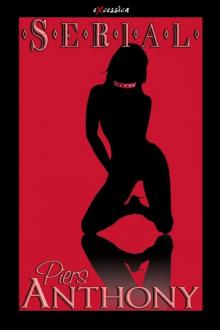 Serial
Serial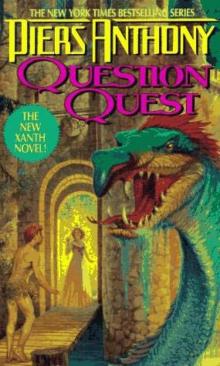 Question Quest
Question Quest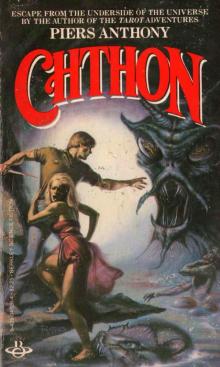 Chthon
Chthon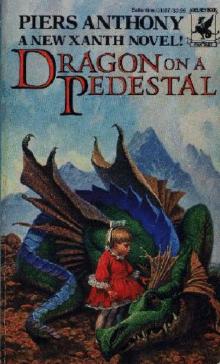 Dragon on a Pedestal
Dragon on a Pedestal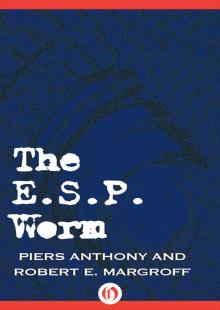 E. S. P. Worm
E. S. P. Worm Hope of Earth
Hope of Earth The Series Boxed Set
The Series Boxed Set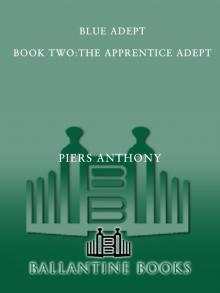 Blue Adept
Blue Adept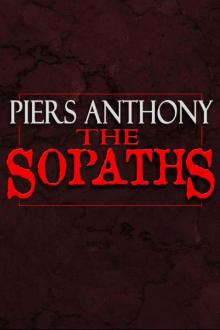 The Sopaths
The Sopaths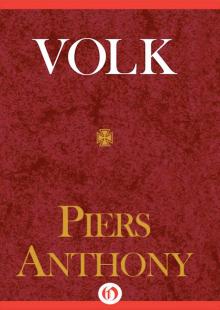 Beetle Juice
Beetle Juice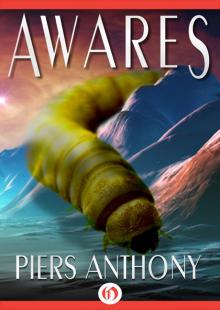 Awares
Awares Golem in the Gears
Golem in the Gears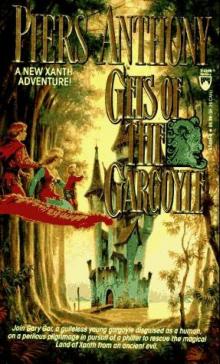 Geis of the Gargoyle
Geis of the Gargoyle Bamboo Bloodbath and Ninja's Revenge
Bamboo Bloodbath and Ninja's Revenge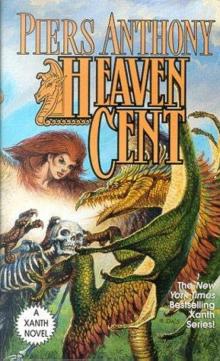 Heaven Cent
Heaven Cent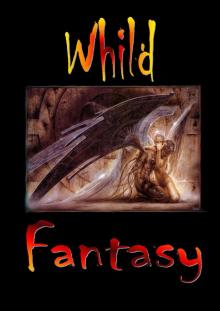 Neq the Sword
Neq the Sword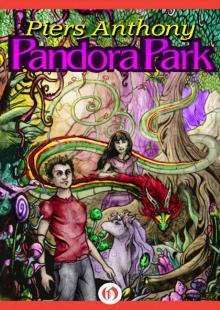 Pandora Park
Pandora Park Juxtaposition
Juxtaposition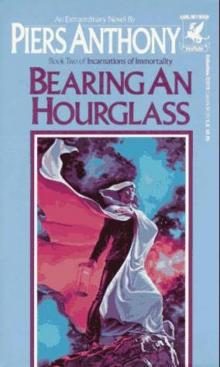 Bearing an Hourglass
Bearing an Hourglass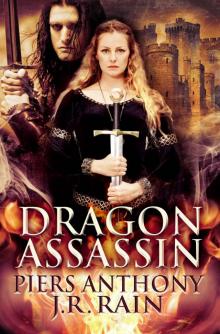 Dragon Assassin
Dragon Assassin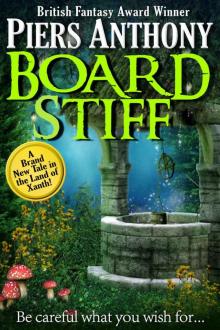 Board Stiff
Board Stiff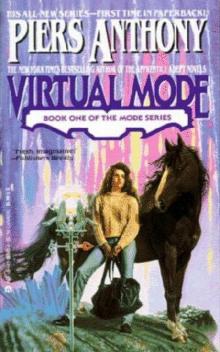 Virtual Mode
Virtual Mode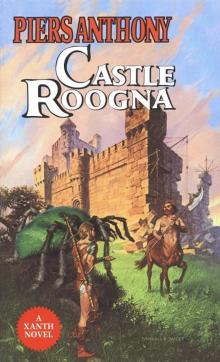 Castle Roogna
Castle Roogna Aliena Too
Aliena Too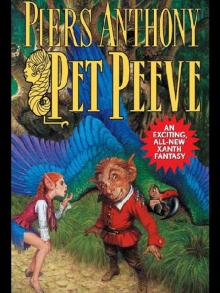 Pet Peeve
Pet Peeve The Metal Maiden Collection
The Metal Maiden Collection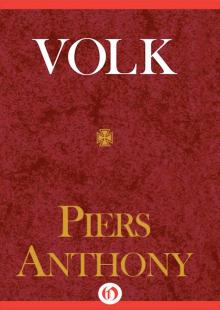 Volk
Volk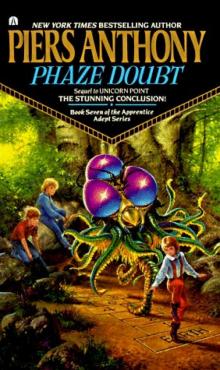 Phaze Doubt
Phaze Doubt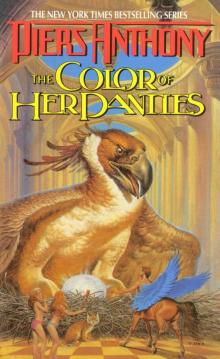 The Color of Her Panties
The Color of Her Panties Amazon Slaughter and Curse of the Ninja Piers Anthony
Amazon Slaughter and Curse of the Ninja Piers Anthony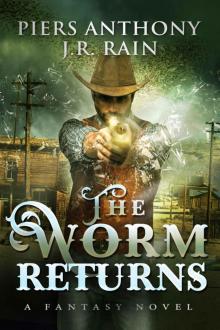 The Worm Returns
The Worm Returns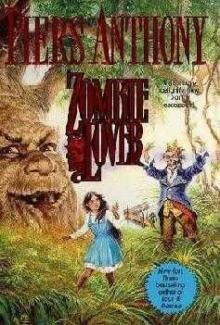 Zombie Lover
Zombie Lover Xone of Contention
Xone of Contention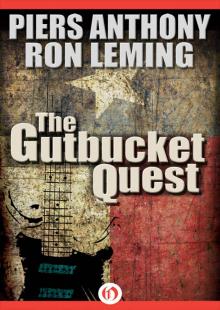 The Gutbucket Quest
The Gutbucket Quest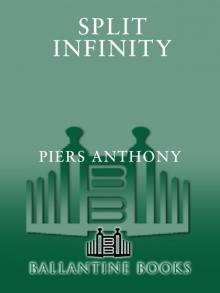 Split Infinity
Split Infinity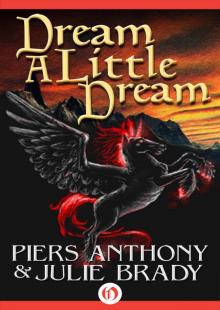 Dream a Little Dream: A Tale of Myth and Moonshine
Dream a Little Dream: A Tale of Myth and Moonshine Balook
Balook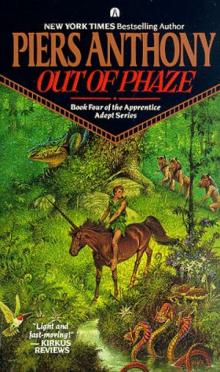 Out of Phaze
Out of Phaze The Secret of Spring
The Secret of Spring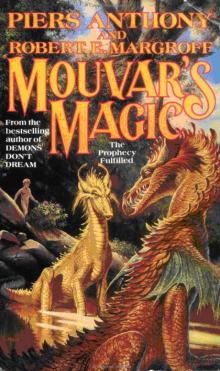 Mouvar's Magic
Mouvar's Magic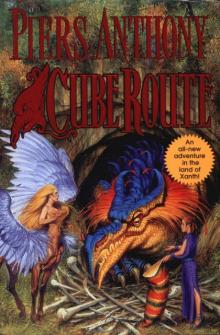 Cube Route
Cube Route Mercenary
Mercenary Total Recall
Total Recall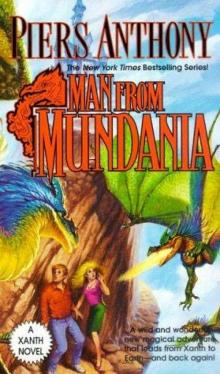 Man From Mundania
Man From Mundania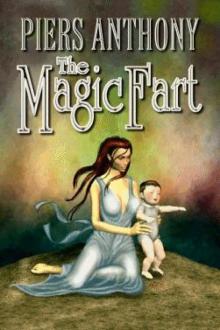 The Magic Fart
The Magic Fart Letters to Jenny
Letters to Jenny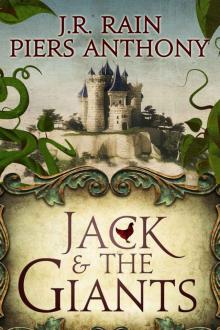 Jack and the Giants
Jack and the Giants Executive
Executive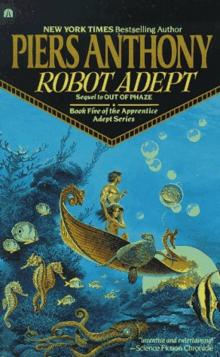 Robot Adept
Robot Adept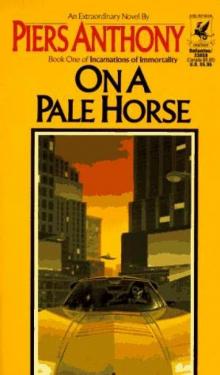 On A Pale Horse
On A Pale Horse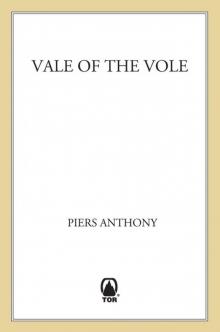 Vale of the Vole
Vale of the Vole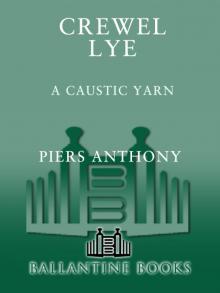 Crewel Lye
Crewel Lye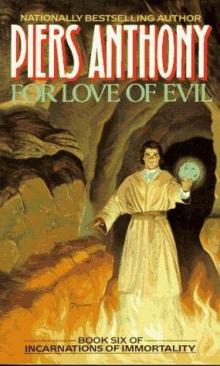 For Love of Evil
For Love of Evil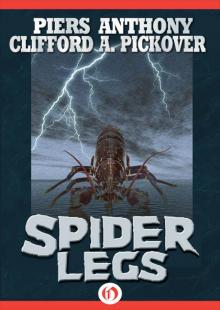 Spider Legs
Spider Legs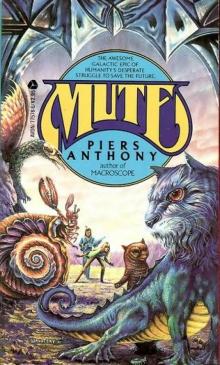 Mute
Mute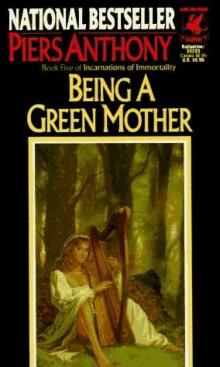 Being a Green Mother
Being a Green Mother Hair Suite
Hair Suite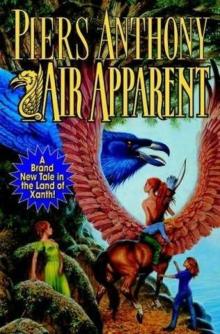 Air Apparent
Air Apparent Politician
Politician Aliena
Aliena Phthor
Phthor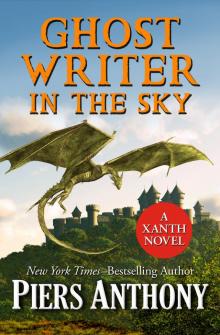 Ghost Writer in the Sky
Ghost Writer in the Sky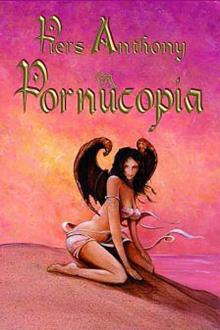 Pornucopia
Pornucopia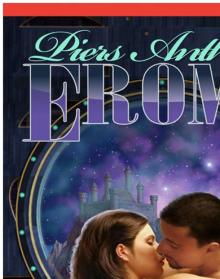 Eroma
Eroma Shepherd
Shepherd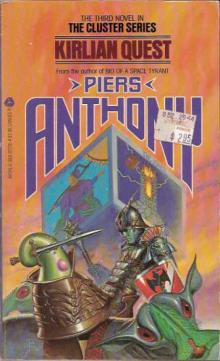 Kirlian Quest
Kirlian Quest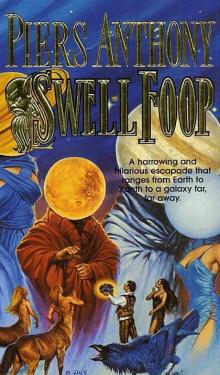 Swell Foop
Swell Foop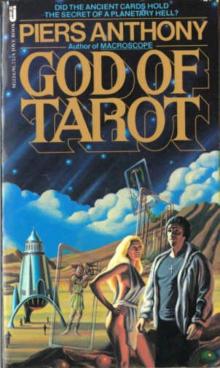 God of Tarot
God of Tarot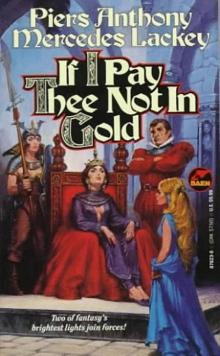 If I Pay Thee Not in Gold
If I Pay Thee Not in Gold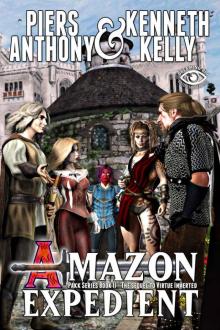 Amazon Expedient
Amazon Expedient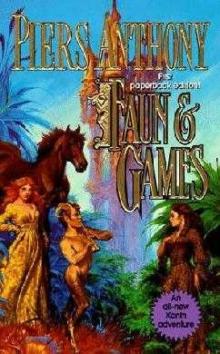 Faun & Games
Faun & Games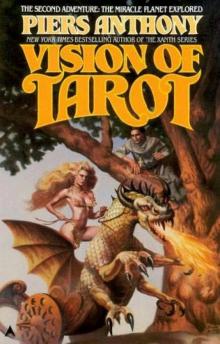 Vision of Tarot
Vision of Tarot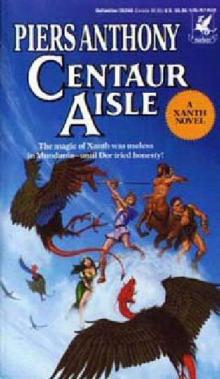 Centaur Aisle
Centaur Aisle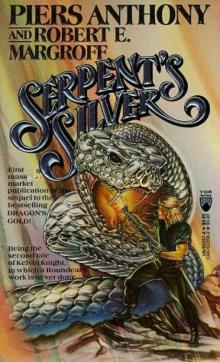 Serpent's Silver
Serpent's Silver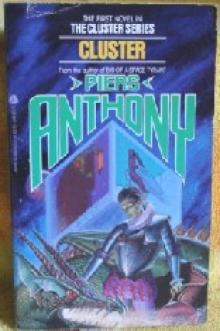 Cluster
Cluster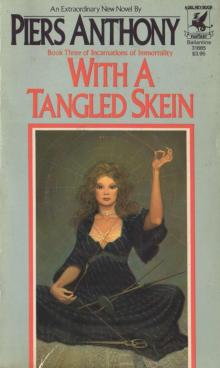 With a Tangled Skein
With a Tangled Skein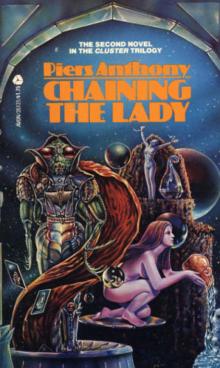 Chaining the Lady
Chaining the Lady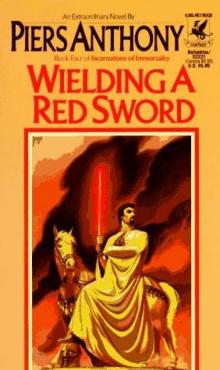 Wielding a Red Sword
Wielding a Red Sword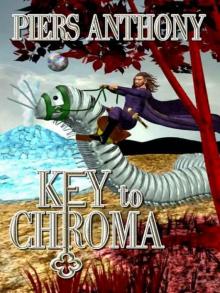 Key to Chroma
Key to Chroma WereWoman
WereWoman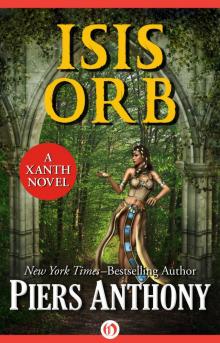 Isis Orb
Isis Orb Hair Peace
Hair Peace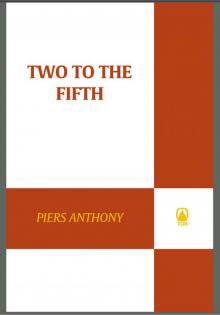 Two to the Fifth
Two to the Fifth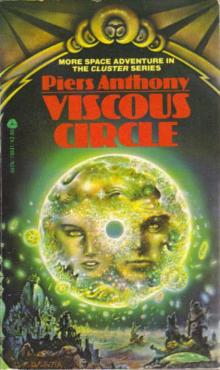 Viscous Circle
Viscous Circle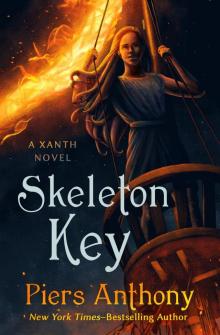 Skeleton Key
Skeleton Key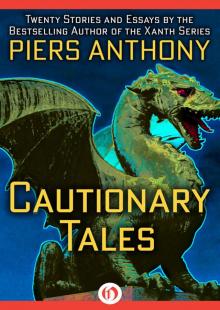 Cautionary Tales
Cautionary Tales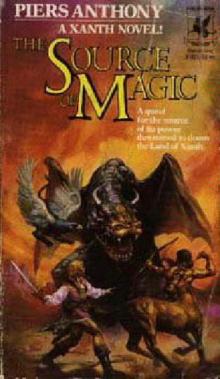 The Source of Magic
The Source of Magic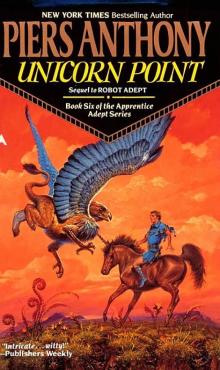 Unicorn Point
Unicorn Point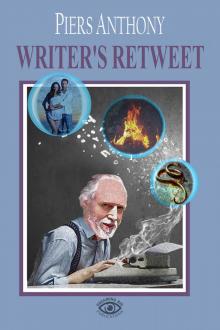 Writer's Retweet
Writer's Retweet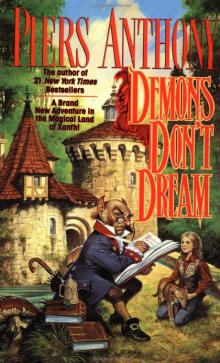 Demons Don't Dream
Demons Don't Dream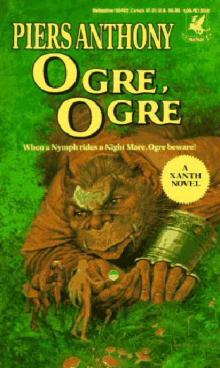 Ogre, Ogre
Ogre, Ogre The Iron Maiden
The Iron Maiden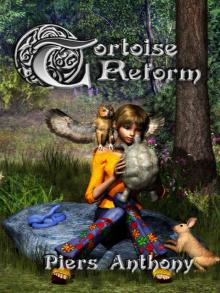 Tortoise Reform
Tortoise Reform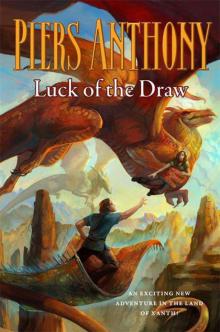 Luck of the Draw
Luck of the Draw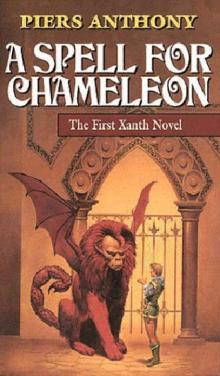 A Spell for Chameleon
A Spell for Chameleon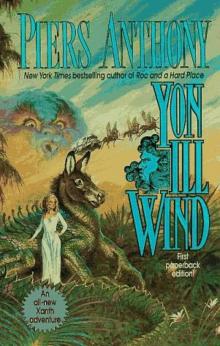 Yon Ill Wind
Yon Ill Wind Currant Events
Currant Events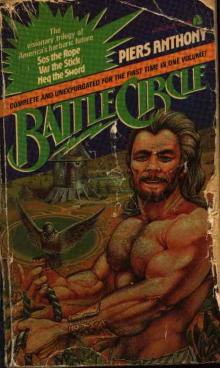 Var the Stick
Var the Stick And Eternity
And Eternity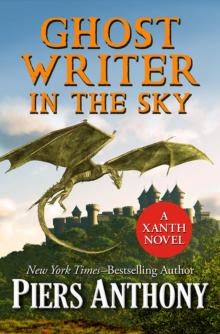 Kiai! & Mistress of Death
Kiai! & Mistress of Death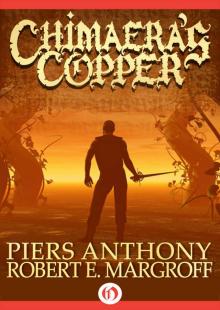 Chimaera's Copper
Chimaera's Copper Refugee
Refugee Isle of View
Isle of View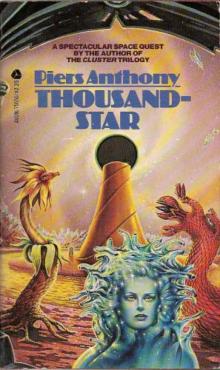 Thousandstar
Thousandstar Mer-Cycle
Mer-Cycle Service Goat
Service Goat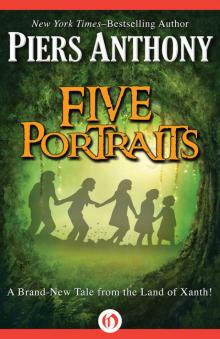 Five Portraits
Five Portraits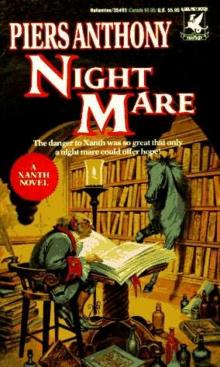 Night Mare
Night Mare Steppe
Steppe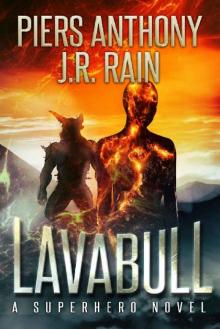 Lavabull
Lavabull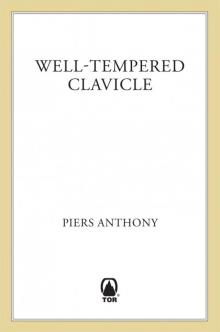 Well-Tempered Clavicle
Well-Tempered Clavicle Aladdin Relighted
Aladdin Relighted Aladdin and the Flying Dutchman
Aladdin and the Flying Dutchman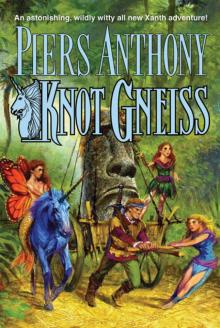 Knot Gneiss
Knot Gneiss Roc and a Hard Place
Roc and a Hard Place Aladdin Sins Bad
Aladdin Sins Bad Flytrap
Flytrap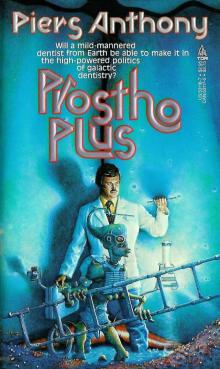 Prostho Plus
Prostho Plus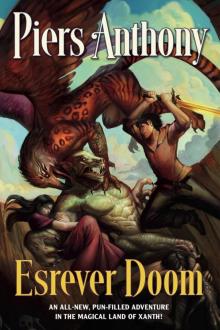 Esrever Doom
Esrever Doom Hair Power
Hair Power The Journey
The Journey Virtue Inverted
Virtue Inverted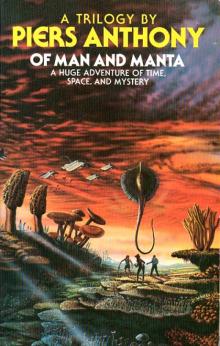 Of Man and Manta Omnibus
Of Man and Manta Omnibus Trail Mix: Amoeba
Trail Mix: Amoeba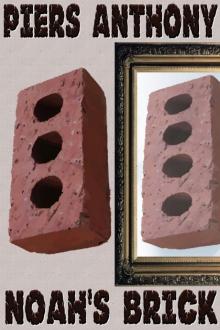 Noah's Brick
Noah's Brick Odd Exam
Odd Exam Magenta Salvation
Magenta Salvation Jest Right
Jest Right Fire Sail
Fire Sail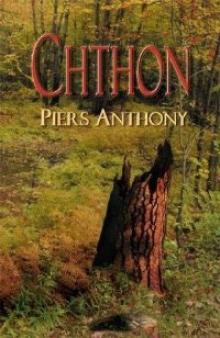 Chthon a-1
Chthon a-1 Amoeba
Amoeba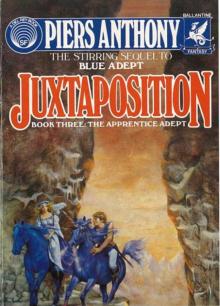 Juxtaposition aa-3
Juxtaposition aa-3 Pira
Pira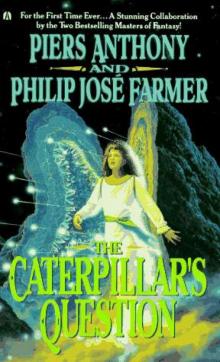 THE CATERPILLARS QUESTION
THE CATERPILLARS QUESTION What Fears Become: An Anthology from The Horror Zine
What Fears Become: An Anthology from The Horror Zine Bio of a Space Tyrant Vol. 3. Politician
Bio of a Space Tyrant Vol. 3. Politician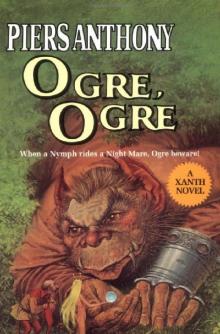 Ogre Ogre x-5
Ogre Ogre x-5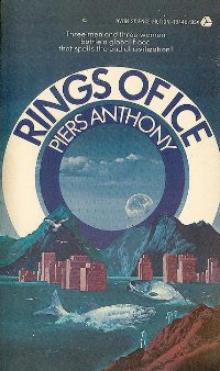 Rings of Ice
Rings of Ice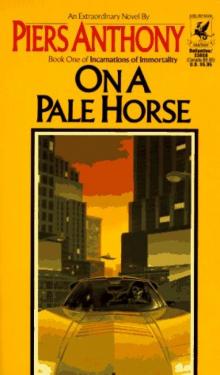 On a Pale Horse ioi-1
On a Pale Horse ioi-1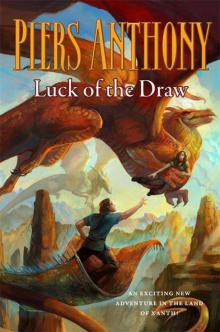 Luck of the Draw (Xanth)
Luck of the Draw (Xanth)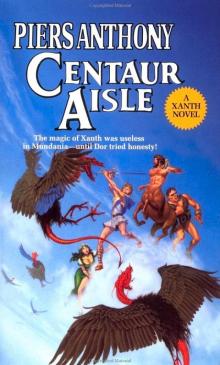 Centaur Aisle x-4
Centaur Aisle x-4 Thousandstar (#4 of the Cluster series)
Thousandstar (#4 of the Cluster series)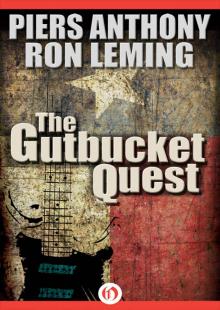 Gutbucket Quest
Gutbucket Quest Isle of Woman (Geodyssey)
Isle of Woman (Geodyssey)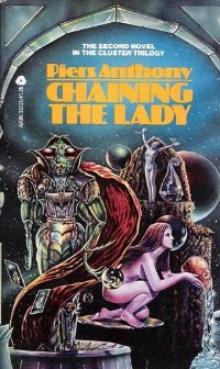 Chaining the Lady c-2
Chaining the Lady c-2 To Be a Woman
To Be a Woman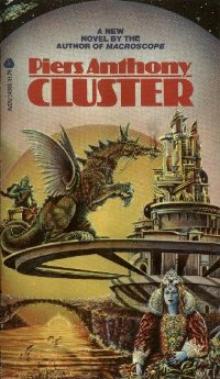 Cluster c-1
Cluster c-1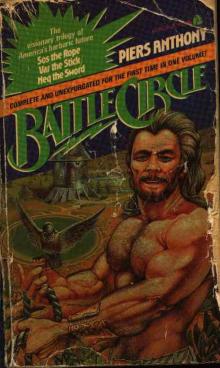 Battle Circle 2 - Var the Stick
Battle Circle 2 - Var the Stick Mercenary (Bio of a Space Tyrant Book 2)
Mercenary (Bio of a Space Tyrant Book 2)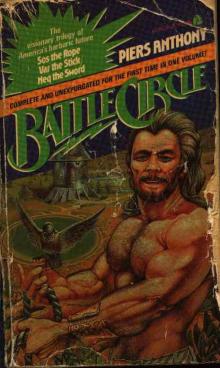 Battle Circle 1 - Sos the Rope
Battle Circle 1 - Sos the Rope Xanth 30 - Stork Naked
Xanth 30 - Stork Naked Secret of Spring
Secret of Spring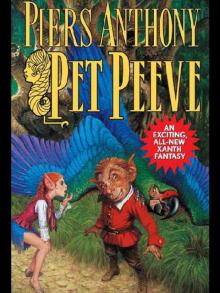 Xanth 29 - Pet Peeve
Xanth 29 - Pet Peeve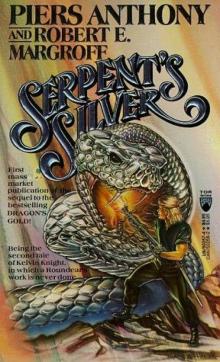 Serpents's Silver
Serpents's Silver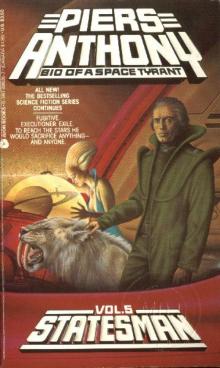 Statesman by Piers Anthony
Statesman by Piers Anthony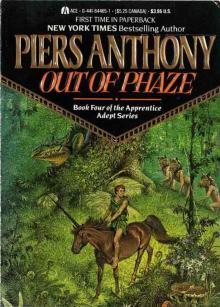 Out of Phaze aa-4
Out of Phaze aa-4 Amazon Slaughter & Curse of the Ninja
Amazon Slaughter & Curse of the Ninja